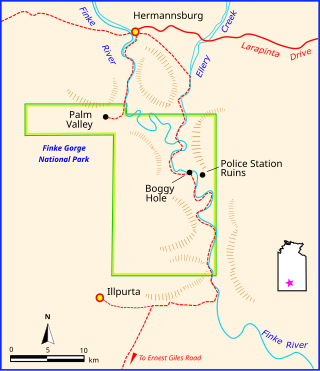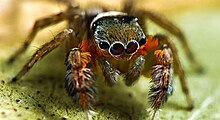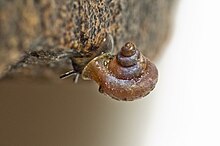
Protected areas of Australia include Commonwealth and off-shore protected areas managed by the Australian government, as well as protected areas within each of the six states of Australia and two self-governing territories, the Australian Capital Territory and the Northern Territory, which are managed by the eight state and territory governments.

Finke Gorge National Park is a protected area in the Northern Territory of Australia located about 1,318 kilometres (819 mi) south of the territory capital of Darwin. The national park covers an area of 458 km2 (177 sq mi), and includes the desert oasis Palm Valley, home to a diverse range of plant species, many of which are rare and unique to the area. There are good opportunities for bushwalking and bushcamping in the national park.

Humpty Doo is a town in Australia's Northern Territory, situated just south of the Arnhem Highway, approximately 40 km from Darwin. At the 2016 census, Humpty Doo had a population of 4,313 people. Its local government area is Litchfield Municipality. The town is a popular stopping point for tourists travelling between Darwin and Kakadu National Park, and boasts many attractions of its own. The main industries are agriculture and tourism; however, most residents commute to Darwin or Palmerston for work, and many regard it as a dormitory town.

WIN Television is an Australian television network owned and operated by WIN Corporation that is based in Wollongong, New South Wales. WIN commenced transmissions on 18 March 1962 as a single television station covering the Wollongong region. The WIN Network has since grown to cover much of regional Australia. The network's name, WIN, originates from its first station, Wollongong's WIN-4. WIN has a programme supply agreement with metropolitan broadcaster Nine Network, covering its stations in Regional Queensland, Southern and Western New South Wales, Griffith, Regional Victoria, Mildura, Tasmania, Eastern South Australia, and Regional Western Australia. WIN also has a programme supply agreement with third-placed metropolitan broadcaster Network 10 for its Northern New South Wales station. WIN also produces and broadcasts weeknight half-hour local news bulletins across its Queensland, southern New South Wales, Victoria, and Tasmania markets as WIN News.

Laura is a rural town and locality in the Shire of Cook, Queensland, Australia. In the 2021 census, the locality of Laura had a population of 133 people.

A BioBlitz, also written without capitals as bioblitz, is an intense period of biological surveying in an attempt to record all the living species within a designated area. Groups of scientists, naturalists, and volunteers conduct an intensive field study over a continuous time period. There is a public component to many BioBlitzes, with the goal of getting the public interested in biodiversity. To encourage more public participation, these BioBlitzes are often held in urban parks or nature reserves close to cities. Research into the best practices for a successful BioBlitz has found that collaboration with local natural history museums can improve public participation. As well, BioBlitzes have been shown to be a successful tool in teaching post-secondary students about biodiversity.

Li Cunxin is a Chinese-Australian former ballet dancer turned stockbroker. He was the artistic director of the Queensland Ballet between 2012 and 2023.

School of the Air is a generic term for correspondence schools catering for the primary and early secondary education of children in remote and outback Australia where some or all classes were historically conducted by radio, although this is now replaced by telephone and internet technology. In these areas, the school-age population is too small for a conventional school to be viable.

Abracadabrella is a genus of spiders in the family Salticidae whose species appear to mimic flies.

Bush Heritage Australia is a non-profit organisation with headquarters in Melbourne, Australia, that operates throughout Australia. It was previously known as the Australian Bush Heritage Fund. Its vision is: Healthy Country, Protected Forever.
Carnarvonchochlea exigua, previously classified as Jardinella exigua, is a small freshwater snail residing in North East Queensland, near Carnarvon Gorge. Carnarvoncochlea refers to the location of origin, whilst exigua derives from the Latin word "exigus" meaning "small".

Earthwatch Institute is an international environmental charity. It was founded in 1971 as Educational Expeditions International by Bob Citron and Clarence Truesdale. Earthwatch Institute supports Ph.D. researchers internationally and conducts over 100,000 hours of research annually using the Citizen Science methodology. Earthwatch's mission statement states that the organization "connects people with scientists worldwide to conduct environmental research and empowers them with the knowledge they need to conserve the planet." As such, it is one of the global underwriters of scientific field research in climate change, archaeology, paleontology, marine life, biodiversity, ecosystems and wildlife. For over fifty years, Earthwatch has raised funds to recruit individuals, students, teachers, and corporate fellows to participate in field research to understand nature's response to accelerating global change.

Bushfires in Australia are a widespread and regular occurrence that have contributed significantly to shaping the nature of the continent over millions of years. Eastern Australia is one of the most fire-prone regions of the world, and its predominant eucalyptus forests have evolved to thrive on the phenomenon of bushfire. However, the fires can cause significant property damage and loss of both human and animal life. Bushfires have killed approximately 800 people in Australia since 1851, and billions of animals.

Robert Whyte is an Australian writer. He was a founding co-owner and director of the Brisbane-based multimedia firm ToadShow. After 2012 he participated in the Australian Government's new species exploration program Bush Blitz. His works include The Creek in Our Back Yard: a practical guide to creek restoration (2011) and A Field Guide to Spiders of Australia for CSIRO Publishing 2017.

Australia's National Reserve System (NRS) is a network of more than 10,000 Commonwealth plus state and territory protected areas which, in combination, on a national scale, protect more than 137 million hectares, greater than 17% of the continent, of unique biodiversity and most significant ecological landscapes for future generations. The aim of the NRS is protect the diversity of all native landscapes, flora and fauna across Australia through strategic habitat protection. It consists of public, indigenous and privately protected areas of land and inland freshwaters.

The North East Australian Football League was an Australian rules football league in New South Wales, Queensland, the Australian Capital Territory and the Northern Territory. The league was formed in November 2010, and its inaugural competition was in 2011. It was a second division league, sitting below the national Australian Football League (AFL) and featured the reserves teams of the region's four AFL clubs playing alongside six non-AFL affiliated NEAFL senior teams. Nine NEAFL seasons were contested between 2011 and 2019, before the 2020 season was cancelled due to the COVID-19 pandemic, and the league was amalgamated into the Victorian Football League from 2021.
An Aboriginal reserve, also called simply reserve, was a government-sanctioned settlement for Aboriginal Australians, created under various state and federal legislation. Along with missions and other institutions, they were used from the 19th century to the 1960s to keep Aboriginal people separate from the white Australian population. The governments passed laws related to such reserves that gave them much power over all aspects of Aboriginal people’s lives.

Arkyidae, also known as triangular spiders, is a family of araneomorph spiders first described by Ludwig Carl Christian Koch in 1872 as a subfamily of Araneidae, and later elevated to a full family in 2017.
Hiltaba Nature Reserve is located in the north of the Eyre Peninsula on the western edge of the Gawler Ranges, South Australia. It is situated on a former pastoral lease known as Hiltaba, or Hiltaba Station, that had operated as a sheep station. It is owned by the Nature Foundation, which purchased the property in 2012.



















